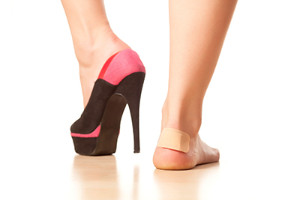
Many women wear high heels as a fashion statement and to increase their height. While these are certainly two important benefits of wearing high heels, there are also many risks. One potential risk of wearing high-heeled shoes is that it might detrimentally alter one’s gait, or walking pattern. For example, women who wear high heels sometimes exhibit shorter gait patterns and unconsciously point their toes. As a result, the gaits of these women exert more pressure on the calf muscles and can ultimately facilitate strain on the feet. Some women who wear high heels might even demonstrate these gait changes when they are not wearing high heels, such as when they are walking barefoot or in a pair of flats. Of course, sometimes wearing high heels can be an unavoidable choice. However, there are several things one might do to mitigate the extent to which high heels can change the gait. Namely, someone might limit the time that high heels are worn throughout the day and set a limit on the number of days in the week in which these shoes are worn. Contact a podiatrist for more information about how high heels can alter your gait.
High heels have a history of causing foot and ankle problems. If you have any concerns about your feet or ankles, contact Lance Greiff, DPM from Great Neck Podiatry. Our doctor can provide the care you need to keep you pain-free and on your feet.
Effects of High Heels on the Feet
High heels are popular shoes among women because of their many styles and societal appeal. Despite this, high heels can still cause many health problems if worn too frequently.
Which Parts of My Body Will Be Affected by High Heels?
- Ankle Joints
- Achilles Tendon – May shorten and stiffen with prolonged wear
- Balls of the Feet
- Knees – Heels cause the knees to bend constantly, creating stress on them
- Back – They decrease the spine’s ability to absorb shock, which may lead to back pain. The vertebrae of the lower back may compress.
What Kinds of Foot Problems Can Develop from Wearing High Heels?
- Corns
- Calluses
- Hammertoe
- Bunions
- Morton’s Neuroma
- Plantar Fasciitis
How Can I Still Wear High Heels and Maintain Foot Health?
If you want to wear high heeled shoes, make sure that you are not wearing them every day, as this will help prevent long term physical problems. Try wearing thicker heels as opposed to stilettos to distribute weight more evenly across the feet. Always make sure you are wearing the proper shoes for the right occasion, such as sneakers for exercising. If you walk to work, try carrying your heels with you and changing into them once you arrive at work. Adding inserts to your heels can help cushion your feet and absorb shock. Full foot inserts or metatarsal pads are available.
If you have any questions please feel free to contact our offices located in Great Neck Bronx, NY . We offer the newest diagnostic and treatment technologies for all your foot and ankle needs.
